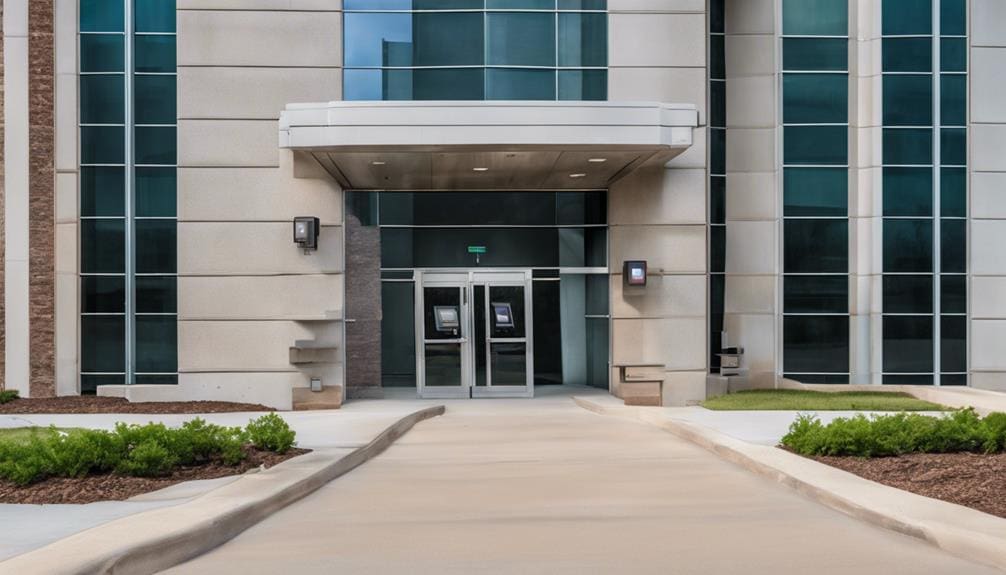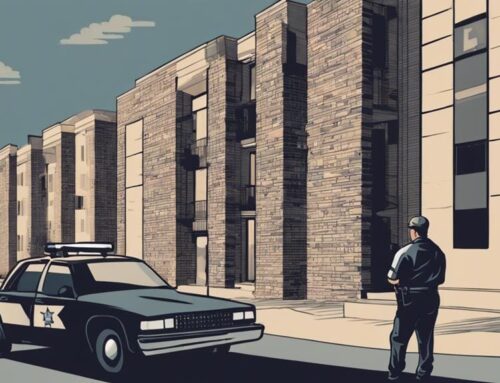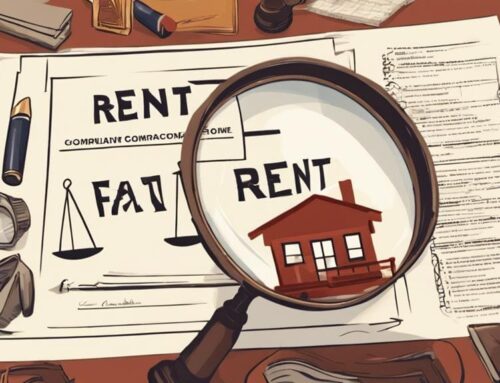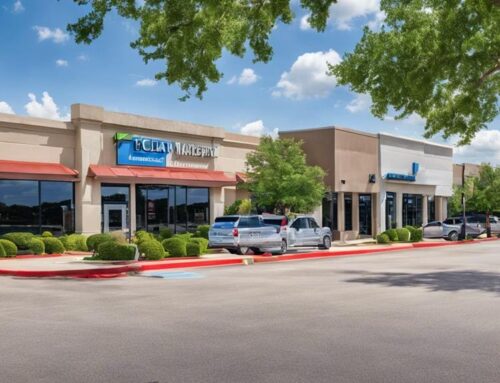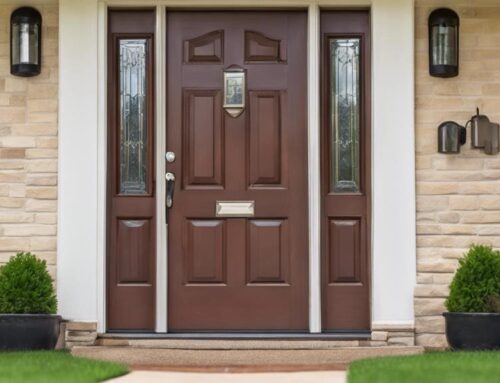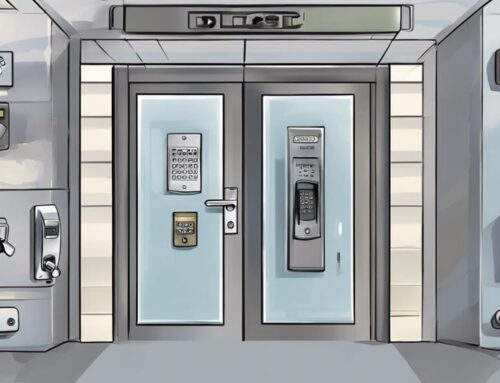In Texas, business door security must conform to specific regulations. You can’t alter locks without a court order and must follow strict legal processes for evictions. Hiring licensed installers is essential—they carry liability insurance and follow state standards. For surveillance, cameras must be visible with proper signage, and recording private areas without consent is illegal. Making sure compliance avoids fines, legal issues, and enhances your business’s reputation. Immediate lockdown and remote access control systems also boost security. Understanding these details guarantees lawful and effective security management. Discover more about maintaining compliance and protecting your business.
Key Takeaways
- Landlords cannot change locks without a court order, ensuring tenant security and legal compliance.
- Licensed contractors with liability insurance are required for installing security systems, ensuring expertise and protection.
- Surveillance cameras must be visible with proper signage, and recording in private areas is illegal.
- Texas mandates clear notification and consent protocols for surveillance to avoid legal consequences.
- Non-compliance with security regulations can result in financial penalties and damage to business reputation.
Overview of Texas Door Security Laws
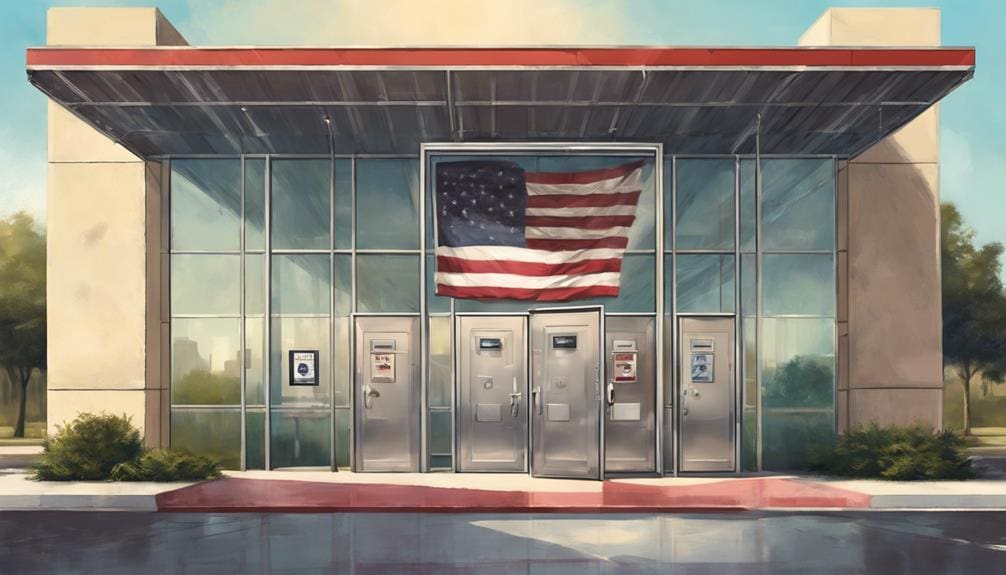
In Texas, landlords can’t alter the locks on commercial tenants without a court order, safeguarding tenants’ rights are protected even if they’re behind on rent. This mandate forms a crucial aspect of security for businesses operating in the Lone Star State. Texas property code section 93.002 explicitly outlines that landlords must adhere to specific legal eviction processes before altering door locks. These regulations are in place to prevent sudden lockouts, providing a sense of security and stability for tenants.
As a commercial tenant, you’re entitled to retrieve your belongings even in the event of an eviction. This legal protection guarantees that your business operations or personal items aren’t unfairly jeopardized. If a landlord attempts to alter the locks without following the proper procedures, they can face legal consequences, reinforcing the importance of compliance with Texas law.
Understanding these door security laws is essential for both landlords and tenants. It creates a balanced power dynamic and fosters a respectful business environment. By ensuring all parties follow these regulations, Texas maintains a fair and secure commercial rental market, where everyone knows their rights and responsibilities. This clarity supports a community where businesses can thrive securely.
Licensing Requirements for Installers
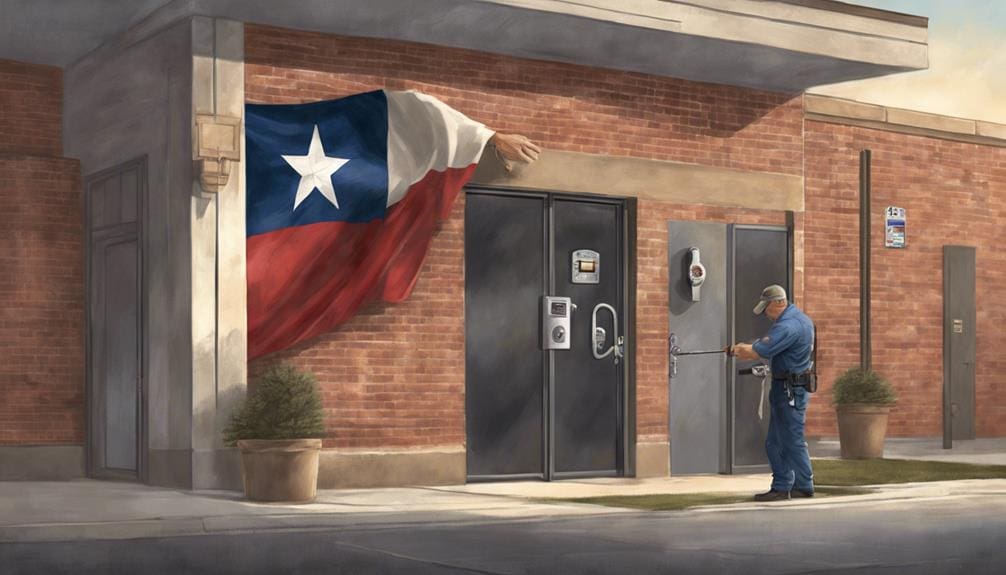
When you hire a licensed installer in Texas, you’re ensuring compliance with state contractor’s licensing requirements. This guarantees knowledgeable and safe installations. Licensed contractors carry liability insurance, protecting your business from potential damages during installation.
Additionally, they offer warranties on their work, providing you with recourse in case of any issues.
State Contractor’s License
To legally install surveillance equipment on public property in Texas, you must acquire a state contractor’s license. This certification guarantees that only licensed contractors handle security system installations, ensuring expertise and adherence to state regulations. Licensed contractors aren’t only knowledgeable but also uphold safety standards, reducing the risk of faulty installations that could compromise security.
Getting a state contractor’s license involves meeting specific criteria, including passing exams that test your understanding of state laws and installation best practices. This process also involves background checks, verifying that only trustworthy individuals can become licensed contractors.
Licensed contractors carry liability insurance, providing protection against accidents or damages during the installation process. This insurance, along with the warranty provided by licensed professionals, gives you peace of mind knowing that there’s recourse if something goes wrong.
Proper licensing also shields you from scams, as unlicensed operators often lack the skills and integrity that come with formal certification.
Compliance and Safety Assurance
Securing compliance and safety in the installation of business door security systems in Texas starts with meeting the state’s stringent licensing requirements for installers. Licensed contractors, regulated by the Texas Private Security Bureau, guarantee that all installations are conducted safely and knowledgeably. This protects your business from unqualified or unscrupulous individuals, reducing risks such as employee theft and faulty installations.
In Texas, a state contractor’s license is mandatory for anyone installing security systems on public property. This licensing guarantees that the installer has the necessary expertise and adheres to state laws, including security camera notification requirements. By hiring a licensed contractor, you’re safeguarding your investment and ensuring the integrity of your security measures.
Here’s why sticking to licensed professionals matters:
- Protection Against Scams: Licensed contractors provide a safety net against potential fraud and ensure recourse in case of poor installation.
- Liability Coverage: They carry liability insurance, protecting your business from unforeseen damages during the installation process.
- Warranty Assurance: Licensed contractors offer warranties on their installations, guaranteeing long-term reliability and peace of mind.
Installation Liability Insurance
Texas mandates that all security system installers carry liability insurance, guaranteeing both the installer and your business are protected against any potential damages or accidents during the installation process. This requirement is a key component of the licensing process for security system installers in the state, reflecting Texas’s commitment to high safety and professional standards.
By hiring a licensed installer with liability insurance, you’re not only complying with state regulations but also safeguarding your business. Liability insurance covers any unforeseen events that might occur during the installation of security systems, providing an essential layer of protection. This insurance acts as a safety net, guaranteeing that any mishaps won’t result in financial strain or legal complications for your business.
Texas’s regulations aim to instill confidence and trust between businesses and installers. When you choose an installer who meets these requirements, you’re making a decision that prioritizes professionalism and safety. It’s about creating a secure environment where both parties can operate with peace of mind.
Embracing these standards guarantees that installations are carried out safely, professionally, and with the utmost care for everyone involved.
Access Control Systems
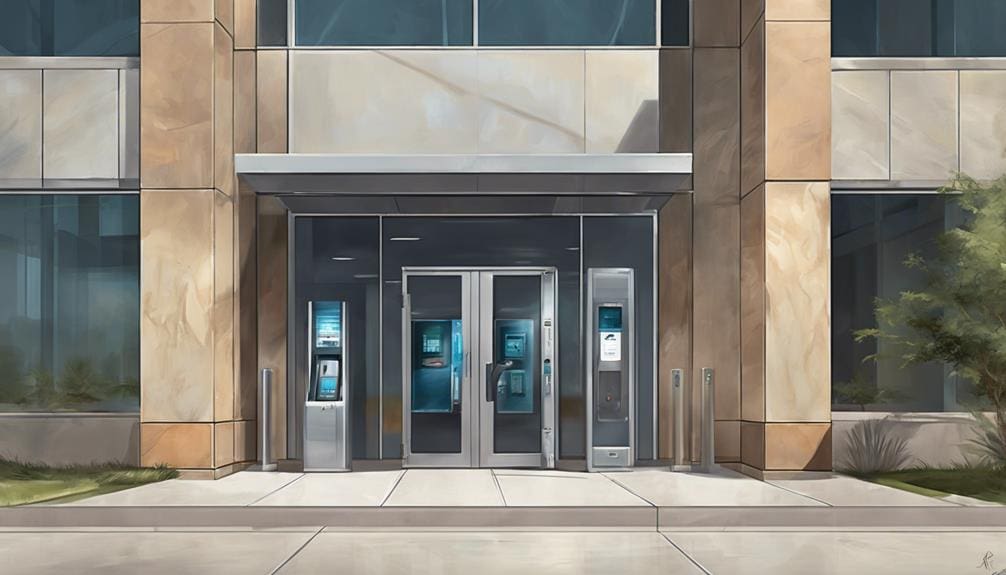
With access control systems in Texas, you can manage door open remotely via computers, tablets, or phones, ensuring seamless security.
You also have the flexibility to customize user access and modify schedules as needed.
In emergencies, initiate an immediate lockdown with a single button press, and set up notifications to alert you if any doors are left open.
Remote Access Control
Remote access control systems empower users to manage and monitor door locks seamlessly from any location using computers, tablets, or phones. This advanced technology greatly enhances your ability to secure your premises, offering unparalleled convenience and security. You can effortlessly modify access schedules, ensuring only authorized personnel can enter at specific times. In critical situations, these systems allow you to initiate immediate lockdowns with just a touch of a button, safeguarding your facility and everyone inside.
Consider the following advantages:
- Enhanced Security: Instant alerts if any doors are left unsecured, providing peace of mind.
- Convenience: Modify access schedules remotely, adapting to changing needs without being physically present.
- Emergency Response: Immediate lockdowns to protect your facility in emergencies, ensuring swift action.
By integrating remote access control systems, you’re not just adopting a security measure but also joining a community of forward-thinking businesses prioritizing safety and efficiency. This technology is particularly beneficial for managing access to buildings, facilities, and sensitive areas securely and efficiently. It’s about creating a safer space where everyone feels they belong and are protected.
Adopting these systems aligns with contemporary security regulations, underscoring your commitment to state-of-the-art security protocols.
User Access Customization
Building on the capabilities of remote access control, user access personalization in access control systems allows you to tailor entry permissions and schedules to enhance both security and operational efficiency. By customizing user access levels, you can guarantee that each individual has the right level of access at the right times, which is essential for maintaining secure access management. These systems enable you to remotely control door locks via electronic devices like computers, tablets, or smartphones, making it convenient to adjust access permissions and schedules on the go.
Here’s a quick comparison to illustrate how user access personalization can be practically applied:
| Feature | Benefit |
|---|---|
| Customizing User Access Levels | Ensures specific access based on roles |
| Schedule Management | Controls access according to time of day |
| Remote Control | Adjust permissions from anywhere |
Immediate Lockdown Alerts
Access control systems in Texas provide businesses with the essential capability to initiate immediate lockdown alerts at the touch of a button, guaranteeing a swift and effective response to emergencies. These systems offer a critical layer of enhanced security by allowing you to control locks remotely via computers, tablets, or phones. This means you can act quickly and decisively, whether you’re on-site or off-site.
Immediate lockdown alerts are essential for maintaining safety in unpredictable situations. By integrating silent panic alert technology, you can discreetly trigger a lockdown from mounted buttons or portable devices. This guarantees that your employees and customers are protected without causing unnecessary panic.
Consider the emotional and practical benefits of immediate lockdown alerts:
- Peace of Mind: Knowing you can secure your premises instantly provides reassurance in high-stress scenarios.
- Enhanced Safety: Quick action can prevent potential threats from escalating, safeguarding lives and assets.
- Operational Continuity: Minimize disruptions by swiftly addressing security breaches, allowing your business to return to normal operations faster.
Legal Use of Surveillance Cameras
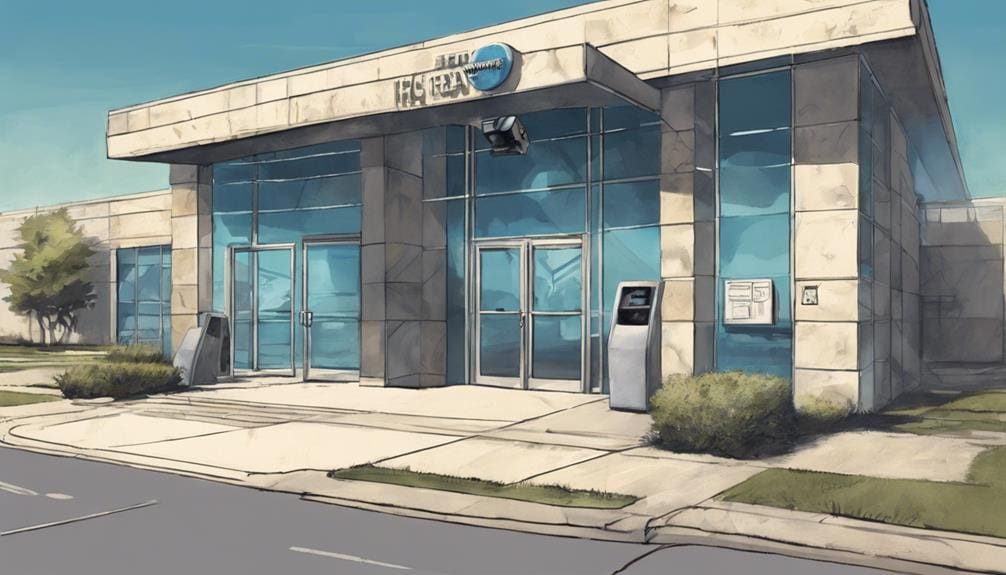
In Texas, surveillance cameras must be clearly visible and accompanied by proper signage to comply with legal requirements. According to the Texas Penal Code Sec, it’s essential for business owners to guarantee their video monitoring systems are prominently displayed. By doing so, you not only comply with state laws but also foster a sense of security and transparency among your patrons and employees.
When you install home security or commercial surveillance systems, make sure to place signs that indicate the presence of cameras, thereby meeting legal standards and enhancing trust.
Furthermore, it’s illegal to record in private areas without consent. This means you can’t place cameras in restrooms, changing rooms, or any other location where individuals expect privacy. Violating this can lead to severe legal repercussions, including fines and criminal charges.
Informing tenants and employees about the presence of surveillance cameras is another vital step. Transparency in your security measures not only aligns with legal requirements but also cultivates a respectful and safe environment.
Tenant and Landlord Responsibilities
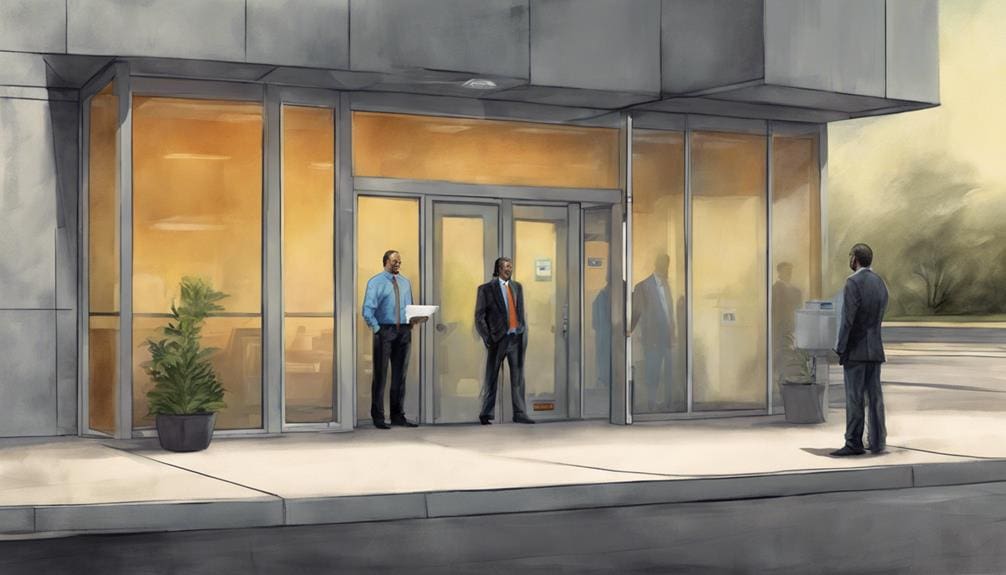
As a landlord in Texas, you must adhere to strict legal processes when it comes to evictions, making certain that tenants are given proper written notice and an opportunity to dispute the eviction in court. You can’t lock out commercial tenants without following these procedures, and any attempt to do so without a court order is against the law. This means you must provide tenants with the required notice and follow specific timelines.
Landlords also need to be aware that:
- Tenants have rights: Even if they’re behind on rent, tenants must receive a written notice before any eviction.
- Changing locks is prohibited: Without a court order, you can’t change the locks and must allow tenants to retrieve their belongings.
- Consequences of illegal actions: Ignoring eviction procedures can result in lawsuits, fines, and reputational damage.
Commercial tenants, on the other hand, should understand their right to dispute evictions in court. This due process guarantees a fair chance for both parties.
Notification and Consent Protocols
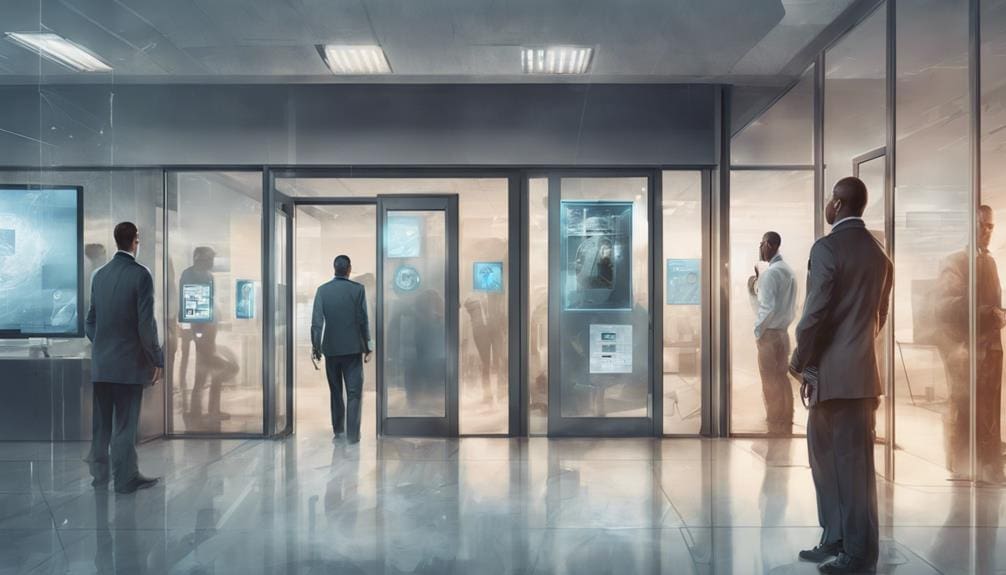
Businesses in Texas must clearly inform both employees and customers about the presence of security cameras to guarantee compliance with state laws. It’s vital to make sure that visible surveillance signs are strategically placed around your premises. These signs serve as an alert to everyone entering the property that they’re being monitored. This step is necessary for obtaining consent for recording, which isn’t only a best practice but a legal necessity.
Including detailed information about surveillance in your employee handbooks and customer agreements establishes transparency and builds trust within your community. It’s important to clearly outline where cameras are located and the extent of the monitoring. This way, you show respect for individual privacy while maintaining security.
Failure to notify and secure consent can lead to serious legal consequences. Texas law is strict about unauthorized surveillance, and businesses that disregard these protocols could face significant liabilities. By adhering to these notification and consent protocols, you’re not only complying with the law but also fostering a safer environment for everyone involved.
Make sure your business is diligent about these requirements to avoid potential legal issues and uphold a culture of transparency and security.
Penalties for Non-Compliance

Failing to adhere to Texas business door security regulations can result in significant financial penalties, with fines ranging from $500 to $10,000 per violation. Non-compliance doesn’t just impact your wallet; it endangers the safety of your employees, customers, and assets. Ignoring these regulations can also result in legal action, including cease and desist orders, injunctions, and civil penalties.
Consider the following consequences of non-compliance:
- Financial Burden: Fines for each violation accumulate rapidly, potentially devastating your business financially.
- Legal Challenges: You risk encountering lawsuits and civil penalties, which can be both time-consuming and expensive.
- Reputation Harm: Non-compliance can damage your business’s reputation, making it more challenging to attract and retain customers.
To avoid these penalties, it’s crucial to stay informed about and adhere to all state and local door security regulations. This compliance not only guarantees a secure and lawful operation but also fosters a sense of safety and trust among your team and clients.
Staying vigilant and proactive about door security regulations isn’t just about evading fines—it’s about safeguarding your business’s integrity and success.
Professional Installation and Maintenance

Maintaining compliance with Texas business door security regulations doesn’t end with understanding the rules; it requires professional installation and regular upkeep to keep your security measures effective and reliable.
Professional installation guarantees that your security systems, including surveillance cameras, are set up correctly, maximizing their effectiveness. This is vital for adhering to security camera laws that mandate proper positioning and functioning.
Regular upkeep by professionals extends your system’s lifespan and guarantees peak performance. By preventing malfunctions, you avoid potential security breaches that could compromise your business. Experts can identify and fix issues before they become significant problems, saving you time and money in the long run by reducing the need for extensive repairs.
Professional services also provide peace of mind. Knowing that your security system is installed correctly and well-maintained means you can trust that your business is protected. A well-maintained system is less likely to fail, ensuring continuous surveillance and compliance with Texas security regulations.
Frequently Asked Questions
What Is Considered Illegal Surveillance in Texas?
In Texas, illegal surveillance includes recording intimate areas without consent, as stated in Texas Penal Code 43.26.
You can’t record others for felonies or legal proceedings without permission, risking civil damages.
Texas requires one-party consent for recording conversations, so at least one person must agree.
Audio recording without consent is discouraged, and hidden cameras are illegal.
Always use visible cameras and inform people they’re being recorded to stay compliant.
Can a Business Have Cameras With Audio in Texas?
Can a business have cameras with audio in Texas?
Yes, but you must obtain consent first. Texas laws require you to inform employees and customers about audio recording. If you don’t, you could face legal consequences, including civil damages and criminal charges.
Do You Need a License to Install Security Cameras in Texas?
Yes, you need a license to install security cameras in Texas. Only licensed contractors can legally install surveillance equipment on public property. This guarantees that installations are done safely and correctly.
Licensed contractors carry liability insurance and offer warranties, safeguarding you from potential scams and poor installations. By hiring a licensed professional, you guarantee compliance with state regulations, providing you peace of mind and a sense of community trust.
What Are the Rights of a Security Guard in Texas?
In Texas, as a security guard, you’ve got the right to detain individuals for suspected criminal activity within a reasonable timeframe.
You must be licensed by the Texas Department of Public Safety Private Security Bureau.
You’re allowed to use reasonable force to protect yourself and others.
Conclusion
In Texas, ensuring your business complies with door security laws is like fortifying a castle—every detail matters. You must follow licensing rules, install access control systems, and use surveillance cameras legally.
Landlords and tenants have specific responsibilities, and you must adhere to notification and consent protocols. Non-compliance can lead to hefty penalties.
By investing in professional installation and regular maintenance, you’re safeguarding not just your property, but your peace of mind.

